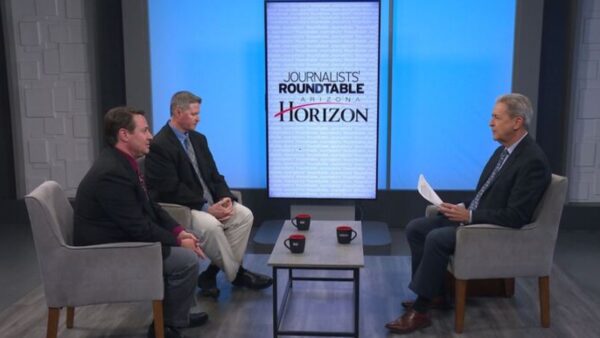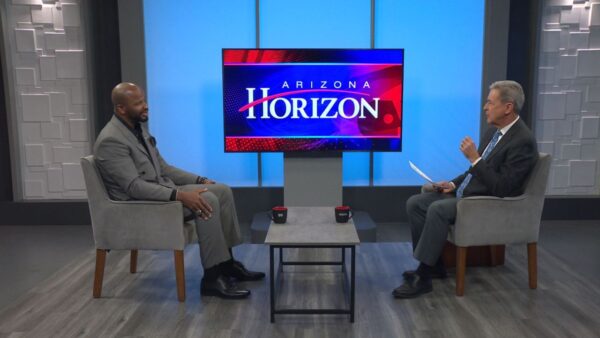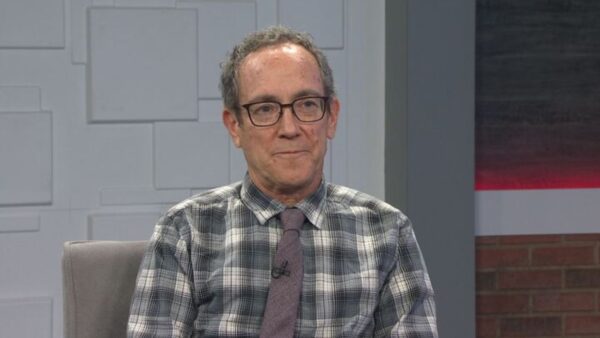CNN national security analyst, author and film producer Peter Bergen will appear at Arizona State University to discuss his new documentary, “American War Generals.” Bergen will talk about that and more on Arizona Horizon.
Video: Coming up next on "ArizonaHorizon," CNN national security analyst Peter Bergen talks about a new project, examining the future of war. Find out how European online privacy rules could impact you. And careers in math are adding up to impressive salary figures. Those stories next on "ArizonaHorizon."
"Arizona Horizon" is made possible by contributions from the Friends of Eight, members of your Arizona PBS station. Thank you.
Ted Simons: Good evening, and welcome to "Arizona Horizon," I'm Ted Simons. ASU is teaming up with a Washington-based think tank to focus on the changing nature of war and conflict, and how those changes will impact future cultures and societies. Peter Bergen is codirector of the "Future of War" project. Bergen is CNN's national security advisor; he's an author and film producer. His new documentary, "American War Generals", is being screened tomorrow night at ASU. It's a pleasure to meet you. Very familiar face, you've been everywhere, haven't you?
Peter Bergen: Wow some places. Thanks. -
Ted Simons: Yes and where lots of shots are being fired and where war is being conducted. Before we start on the conversation, what is war?
Peter Bergen: Well, war is a feature of the human condition that is not going to disappear, it's a competition often about fear or interests or -- and sometimes just no one wants war, of course. The famous line from Lenin, you may not be interested in war but war may be interested in you. So the point of this project is to kind of consider how war is changing because, as we were discussing, war is --the clean line between war and peace doesn't really exist anymore. Our conflict with al-Qaida will be lengthy. The drone campaign in Pakistan, it's a warlike activity, but we're not at war with Pakistan. And all the cyber-attacks the Chinese are launching against us are they acts of war? Cyber espionage? When a cyber-attack gets big enough, at what point do we say hey, they merit some war-like response from us. And these are some of the questions we're trying to answer.
Ted Simons: And indeed, that's why I asked the question for a definition because it's really had to figure out I've used the comparison of it being kind of a low-grade fever all around the world. You can't knock it out. The conflict, instead of beginning and ending, it seems to go on.
Peter Bergen: Obviously war in Iraq is now in its 11th year. It could go on for another decade. Some of these wars we see around the world are insurgencies or civil wars that seem to go on for a long time. It's suggested they take at least a decade. In Columbia there's been an insurgency in Colombia for four decades. War is kind of changing, certainly the kinds of wars that we, the United States, has been engaged in. When we think of war we think of World War II, a beginning, a middle and an end. It's much more likely the United States is engaged in what we're seeing in Iraq which is we're going back in small numbers, the President has said no American boots on the ground. That's perhaps euphemistic. There are advisors in Iraq already, and the President is considering whether to send advisors to Syria or some kind of military response in Syria.
Ted Simons: And you mentioned military advisors, people of a certain age will go, I remember that back in the 60s with Vietnam.
Peter Bergen: 1962, President Kennedy, Vietnam, it started small.
Ted Simons: The impact and you mentioned technology, the impact of drones, special ops, civilian targets, areas being used as bases, that's all very new.
Peter Bergen: Yeah. In some ways it's back to the future. We tend to -- war is changing, we used to think of it as competence and civilians. It doesn't have headquarters, a conventional chain of command. When I say al-Qaeda I mean groups like ISIS and Iraq, a sort of splinter group al-Qaeda. The kinds of enemies of the United States, faced by playing different rules, and trying to understand that. But we're seeing it with, you know, we haven't seen cyberterrorism yet, but we've seen non-state actors using cyber-attacks, Syrian free electronic situation launched cyber-attacks on the free press. They were basically able to manipulate the information A.P. was putting out and that there was an attack on the White House. It caused the Dow to drop 150 points. So the point is that this group, which is probably affiliated with the Syrian government in some way, these shadowy groups with no return addresses can perhaps play into cyberspace in a bigger way and actually have effects on American society.
Ted Simons: So, the "future of war" project looks at what's happening out there right now, comparison to the past, looks at what possibly could happen in the future. What's going to happen here?
Peter Bergen: Yeah, we're a group with a people of a lot of different backgrounds. ASU brings--the largest public research university in the country where Washington base-we have technologists, lawyers, experts, experts on national security and the military and we're all trying to think together, let's try and describe what the state of play is. Once we've described the state of play, what if anything should we be thinking about in terms of maybe new international laws or norms around the use of cyber war fare drones because the United States has--had a monopoly on war drones and a monopoly on effective armed cyber-attacks. That isn't going to last forever. We used to have a monopoly on nuclear weapons, and at some point we didn't. The rules of the road benefited everybody including the United States. What kind of legal frameworks should we be thinking about? Should we be thinking about cyber-attacks that reaches an act of war? Is there some sort of threshold we should consider or norms about those thresholds?
Ted Simons: When you discuss and research these things, going back to ISIS and whatever groups are calling themselves these days and al-Qaeda. You mention the rules of the road from a distance. You've covered these and talked to him, you interviewed Osama bin Laden for goodness sakes. It doesn't seem like there are any rules or roads, it just seems chaos.
Peter Bergen: The United States is the guarantor of international order and we've benefited tremendously from that. We, the United States, have a strong interest in creating the rules of the road. Sure, al-Qaeda may not observe them but other states, the Chinese, the Russians, the Iranians, these countries now have armed drones. They can say hey, we think they are a group of people we consider terrorists just outside our borders. You've kind of created the precedent. So we need to be thinking about a regime everybody can agree to. 1925 every country around the world said we are not going to use chemical weapons. And that has been pretty effective.
Ted Simons: Thus far, yeah.
Peter Bergen: In World War I they were used routinely. It's not pie in the sky. War throughout recent history, luckily war is being constrained by law. And that's part of our interest, is to try and think about what are the international legal frameworks to think about how we are changing the nature of war, how should the international community think about it.
Ted Simons: And in your dealings again, in the Middle East especially, from Afghanistan to even Africa and all points in between, and what we see as Islamic extremism, groups seem to be taking religion and using it for entirely political purposes. Be that as it may, when you see this, does it feel like it's a major bump in history, or is history making a turn and going on that direction as far as future of conflict?
Peter Bergen: Unfortunately, luckily on 9/11, they are not going to get lucky in that way again, not at all. Al-Qaeda and groups that are subscribed to this ideology, they are a huge problem in the Middle East right now. But, As an American national security problem, our defensive measures have changed dramatically. There was no TSA on 9/11; no DHF; no national counter-terrorism center; the FBI and CIA didn't talk to each other. You know, the public wasn't aware this is a problem. We're a very high target now so even if one of these groups tries to get together and attack; it's not likely to succeed except in the case of here-grown extremists, influence by the ideology which we saw in Boston and we saw at Fort Hood and so it's hard to prevent that basically.
Ted Simons: And yet in Europe, very different scenario. I know there are areas around the world; I mean we are separated by a couple of oceans here. We're very secured in that way, can't say that over parts of Europe.
Peter Bergen: Well you can drive from Paris to Damascus. I mean, so it's a whole different deal and we've already seen people coming from the Syrian conflict on May 24th, s Frenchman allegedly killed four people at a Jewish museum in Brussels and he basically been trained in Syria so, you know, for the Europeans it's a much bigger problem because it's much more proximate and many more of their citizens have gone. I mean, 700 Germans, 300 plus French, 500 plus Brits. We've had 100 Americans who've either gone or attempted to go. And that's not great, but it's a much more of a number in particularly since we're a much larger population.
Ted Simons: As far as your film, really quickly before you go now, you are screening your film tomorrow night, talk to us about this and what exactly are you trying to get across?
Peter Bergen: Well, we basically, it goes to- the things we were just discussing which is about the army and is told through the stories and careers of the leading combat generals- General Pow, General Patrez, General McCrystal and others. You know, the army is always preparing for the fight they can win. They want to fight, they want to fight the Germans or they want to fight Sadam Hussein's tan army because--what happens whether it's Vietnam or Iraq or Afghanistan, something comes up which is a very different form of fight. And it's really about that kind of tension and how the army sort of, both learns and then forgets, and comes back and relearns the lessons of previous conflicts which is basically a lot of these conflicts are going to be guerilla- wars which are messy and lengthy and complicated.
Ted Simons: Well with that in mind before we'll let you go, I have to ask you one question. Are you optimistic in general over things?
Peter Bergen: Yeah, I'm a huge optimist. I mean, you know, I think when in history you consider the things that have happened in the last century the Holocaust, World War I and World War 2, what we're going through now is just a mind of blip.
Ted Simons: Alright, well it's a pleasure to meet you.
Peter Bergen:National Security Analyst, Author and Film Producer, CNN;




















